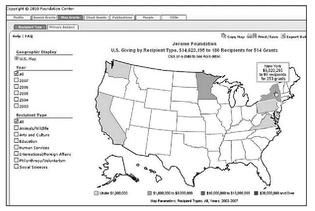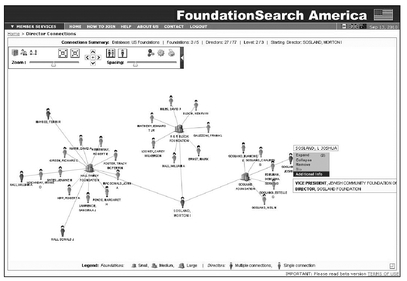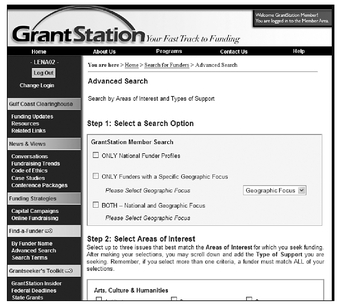Foundations
Your research on foundations—private, public, corporate, and others—will usually start with an online directory, proceed to the foundations’ websites, and then go on to look at their IRS informational return. Websites maintained by associations of grantmakers and others offer an alternative to directories, with the advantage of having already screened out foundations that, for example, don’t fund your type of charity or don’t make grants in your geographic area. Let’s take a look at each resource.
Directories
Grant writers acknowledge the Foundation Center as one of the most important sources of information on foundations (private, public, and corporate) in the United States. You’ll find the addresses of its five offices across the United States in Appendix B. There are also more than 400 reference sections in public and private libraries and at community foundations that make Foundation Center publications and other reference works available to the public. Addresses of these facilities can be found on the Center’s website (foundationcenter.org).

WORDS TO THE WISE
To stay on top of the news about funders and the latest RFPs, sign up for a free e-mail subscription to Philanthropy News Digest, which is found on the Foundation Center website under “Newsletters.” It also has a free weekly jobs listing.
The Foundation Center issues reports on different issues in philanthropy and provides access to a wide range of information on grantmaking. It offers a wide range of training and classes, including quick tutorials on writing grants, preparing budgets, and researching funders. It also offers classes on grant writing, some at its offices, many online, some free, and others for a fee.
Canadian fundraisers will find many of the same services at Imagine Canada (ccp.ca). These include a searchable database of funders and grants for a fee. Imagine Canada also researches issues in the nonprofit sector and acts to develop public policy favorable to nonprofits and donors.

The Foundation Center’s home page is your first stop for many foundation research projects.
The Foundation Center publishes directories that are considered the standard in the business. Its signature publication is the Foundation Directory, which is available both in print and online.
The Foundation Directory Online
The Foundation Directory Online (or FDO; fconline.foundationcenter.org) puts at your fingertips all the critical information you’ll need to research foundation funders, including corporate foundations and other corporate giving offices. You can search by the name of the funder as well as the name of the recipient. Look up which grants your closest peer nonprofits have received, and you have an instant prospect list! It offers many other search options, including what subjects are of interest to each funder, geographical locations and restrictions, and trustee names.
Once you’ve located a potential funder, you can search its grants using many criteria such as subject area, the year grants were made, or the amount. You can also use a handy map interface to quickly find grants made in your county. If you’re more interested in grants made in your subject area, use the chart interface to break down the foundation’s giving in that way.

The map tool lets you see at a glance where a foundation makes it grants, and mousing over a state reveals the specifics on giving in that state. (Map from Foundation Directory Online, Copyright © 2010 The Foundation Center. Used by permission.)
You can save searches and build a prospect list. You can even ask FDO to send you an e-mail each time a foundation you’re interested in updates or changes its profile.

WORDS TO THE WISE
Although the premium Internet search tools are great, don’t overlook what’s available for free, including the Foundation Center’s Foundation Finder, a wealth of information at GuideStar, and the links available on websites of community foundations and regional associations of grantmakers.
As you can see, FDO offers many tools for the grant seeker. One of FDO’s most user-friendly aspects is the option to subscribe to it for as little as a month (ample time to do research for a particular project). A full year of the professional version with all the bells and whistles will cost you more than a thousand bucks, but if you’re planning on getting into grant writing as a profession, you’re going to need around-the-clock access to an online funder database.
The Foundation Center also offers a good deal of information on its website for free. The most important free resource for you is the Foundation Finder. This database contains the most up-to-date information you can find in one place on the Internet for foundation addresses and contact names. If a foundation has a website, there will be a link to it, and like GuideStar (discussed later in this chapter), the Foundation Center provides links to foundations’ IRS returns. This is a great free resource.
The Foundation Center also is behind the website GrantSpace (grantspace.org), which brings together webcasts, podcasts, and other training opportunities. There are also sector-specific information areas for the arts, education, health, social services, and many other fields.
FoundationSearch
FoundationSearch (foundationsearch.com) provides the Foundation Center with some stiff competition. It offers pretty much the same search features, but it includes approximately five times as many grant listings. One reason for the discrepancy in the number of grants is the Foundation Center’s policy of purging old grants when it adds new ones. Their point is that grants made more than five years ago might not reflect a foundation’s current interests. There’s a lot of truth in that, but for the most comprehensive list of grants, go to FoundationSearch. Another of FoundationSearch’s distinguishing features is the inclusion of information on government grants.
Many grant seekers will find FoundationSearch’s tools for building and managing a prospect list very helpful. Enter information about your organization and the kind of project you need to fund, and “My Prospect Generator” will return a list of potential prospects. You can then drill down and learn more about each of the prospects and save the best ones in a list for future reference. You can set up alerts to e-mail you when anything in a foundation’s record changes and even get an e-mail to remind you of a foundation’s upcoming deadlines.
A new feature for FoundationSearch in 2010 was Director Connections. This fun visual tool makes it possible to discover connections among foundation trustees and corporate directors. It’s great for finding out who knows who. It’s similar to a free tool you can find at muckety.com but is more focused for researching funders.

Director Connections from FoundationSearch can reveal important relationships among funders. (Copyright © 2010 FoundationSearch. Used by permission.)
FoundationSearch has a minimum one-year subscription, which is quite pricey. You get big discounts for longer subscriptions, and with its most comprehensive subscription package, you also have access to classes that will help you qualify for the Association of Fundraising Professionals’ CFRE certification.
FoundationSearch offers similar features and databases for foundations in Canada (where the company is located), the United Kingdom, and Australia.
GrantStation
Another good online resource is GrantStation (grantstation.com). Fewer funders are included in GrantStation’s database (some 8,000+), but look at what it’s left out:
• Foundations that do not accept unsolicited proposals
• Foundations that only fund one or two organizations
• Foundations that fund only scholarships
Most of the foundations left out are ones that wouldn’t have been of use to you anyway (unless, of course, you’re looking for scholarship funds). Foundations, corporate giving offices, and state and federal funding agencies are all included. GrantStation also provides information on about 1,000 international funders (half of which are in Canada).

WORDS TO THE WISE
You’ll undoubtedly discover information on funders that doesn’t fit with any grant you’re working on now, but save it—it may just be what you need for a proposal you’ll work on a year from now. Be sure to note where and when you found the information in case you need to consult that source for additional facts or check that the information remains correct.
GrantStation’s approach is to provide you with detailed information on what the foundation will support, leaving information such as trustee names and extensive lists of grants for you to find on the foundations’ websites—links to which are always provided. This practical approach can save you from becoming bogged down in information that’s only of interest later in the grant-writing and research process.

This page from GrantStation.com shows a few of the search categories available. Also note the many other features listed in the left column.
GrantStation’s “area of interest” database search provides, to me, more useful choices than other online directories (which offer general categories like “program support” or too specific such as “art therapy” while not providing a search on the more inclusive “art”). There are 160 different areas of interest to choose from, and each is clearly defined. Unlike the Foundation Center or GuideStar, GrantStation supplies integrated information on grants from all sources, including foundations, nonprofit organizations, corporations, and government agencies.
More than a database, GrantStation also provides the following:
• A free weekly funding update newsletter
• A very thorough grant-writing tutorial that includes many examples, how-tos, and worksheets
• Webinars
• Links to funders nationally
• Links to state government funding sources
• Listings of federal grants
• A grant deadlines listing
GrantStation also devotes considerable effort to keeping deadlines up-to-date so you won’t miss an opportunity.
GrantStation’s basic membership fee is about the same as the Foundation Center’s mid-level service rate, making this a site definitely worth looking into.
GuideStar
GuideStar was the first website to make available the IRS 990 forms for every nonprofit. As noted earlier, the Foundation Center also makes 990s available, but only for foundations and public charities that make grants. GuideStar includes all nonprofits that file these forms and allows you free access to the information if you take a minute for a simple registration.

WORDS TO THE WISE
Each nonprofit organization in the GuideStar database has the option to add a full report, including a list of its board of directors, goals for the year, accomplishments of last year, and even a newsletter. If your charity has not created a full report, do so. It’s free marketing and, for an increasing number of individual funders, GuideStar serves as a charity marketplace. Do it today!
Funders’ Websites
Funders’ websites run the gamut from nonexistent; to a few static pages; to beautiful Flash presentations that elaborate on their funding philosophy, list all grantees with hyperlinks, and give you complete financial information. I would never prepare a grant without first checking a foundation’s website.
Here are some really good foundation websites for you to explore:
Arthur M. Blank Foundation
blankfoundation.org
blankfoundation.org
The visuals tell you a great deal—no matter what the focus area, the real focus is on kids. You’ll find good explanations of programs and helpful grant lists here.
Joyce Foundation
joycefdn.org
joycefdn.org
Not only does it list its grants, but it also gives a short statement of what the grants were for—information every grant writer wants to know but seldom finds so easily.
W. K. Kellogg Foundation
wkkf.org
wkkf.org
This is a real techie website. An interactive database gives you access to the details on grants going back more than 10 years. You can then use links to find grants to the same organization or to groups in the same city, and on and on. Additionally, it provides access to a number of studies and helpful publications for nonprofits. You also apply for a grant online.
The William Randolph Hearst Foundations
hearstfdn.org
hearstfdn.org
The site gives the details on all their grants going back several years and links to each grantee’s website. It also provides clear directions on how to apply and what kinds of projects it looks for.
Verizon
foundation.verizon.com
foundation.verizon.com
Verizon was the first company to accept grant applications online exclusively. The forms are easy to complete, and a quick online eligibility test prevents you from wasting time if you don’t fit the guidelines.
Sector Websites
Grantmakers apparently never miss an opportunity to join an association of colleagues. There are associations of grantmakers by region, by state, by area of funding, by type (such as family foundations and a different one for small family foundations), by region and type …. Well, you get the idea.
Although intended for the grantmakers, grantmaker association websites offer information for the grant seeker as well. Many of the regional associations accept a standardized application form, which can save you some time. (But you will still customize each application, right?) Publications and notices of conventions—and they all have conventions—can give you clues to the hot topics with that group of funders and what jargon is currently popular.
Check out the following grantmaker association websites:
Canadian Environmental Grantmakers Network
cegn.org
cegn.org
This is a database of funders to environmental causes in Canada, with links to their websites. Membership in the CEGN gives you access to additional information.
The Council on Foundations
cof.org
cof.org
Check out the links here to many foundations and other associations. Convention information is worth a quick scan for buzzwords and current interests.
Giving Forum
givingforum.org
givingforum.org
This site provides links to the numerous regional associations and its standardized application forms.
Grantmakers Concerned with Immigrants and Refugees
gcir.org
gcir.org
This site includes links to foundations and tips on grant writing.
Grantmakers in the Arts
giarts.org
giarts.org
This site has all types of funders, from foundations to corporate giving programs and grantmaking public charities, in a listing with links.
Grantmakers in Health
gih.org
gih.org
This site includes no links to foundations, but it has lots of links to studies that might provide backup for your proposal’s assertions.

WORDS TO THE WISE
The sector sites narrow the playing field for you. Just don’t let the funders on these sites be the only ones you investigate. Your organization is different in some way from every other organization performing the same services, and there are undoubtedly funders out there uniquely for you.
..................Content has been hidden....................
You can't read the all page of ebook, please click here login for view all page.
